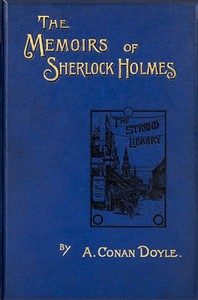The Memoirs of Sherlock Holmes by Arthur Conan Doyle (ebook reader for pc and android .txt) 📗

- Author: Arthur Conan Doyle
Book online «The Memoirs of Sherlock Holmes by Arthur Conan Doyle (ebook reader for pc and android .txt) 📗». Author Arthur Conan Doyle
“You said you had a clue?”
“Well, we have several, but we can only test their value by further inquiry. The most difficult crime to track is the one which is purposeless. Now this is not purposeless. Who is it who profits by it? There is the French ambassador, there is the Russian, there is whoever might sell it to either of these, and there is Lord Holdhurst.”
“Lord Holdhurst!”
“Well, it is just conceivable that a statesman might find himself in a position where he was not sorry to have such a document accidentally destroyed.”
“Not a statesman with the honourable record of Lord Holdhurst?”
“It is a possibility and we cannot afford to disregard it. We shall see the noble lord to-day and find out if he can tell us anything. Meanwhile I have already set inquiries on foot.”
“Already?”
“Yes, I sent wires from Woking station to every evening paper in London. This advertisement will appear in each of them.”
He handed over a sheet torn from a note-book. On it was scribbled in pencil:
“£10 Reward.—The number of the cab which dropped a fare at or about the door of the Foreign Office in Charles Street at quarter to ten in the evening of May 23rd. Apply 221B, Baker Street.”
“You are confident that the thief came in a cab?”
“If not, there is no harm done. But if Mr. Phelps is correct in stating that there is no hiding-place either in the room or the corridors, then the person must have come from outside. If he came from outside on so wet a night, and yet left no trace of damp upon the linoleum, which was examined within a few minutes of his passing, then it is exceeding probable that he came in a cab. Yes, I think that we may safely deduce a cab.”
“It sounds plausible.”
“That is one of the clues of which I spoke. It may lead us to something. And then, of course, there is the bell—which is the most distinctive feature of the case. Why should the bell ring? Was it the thief who did it out of bravado? Or was it some one who was with the thief who did it in order to prevent the crime? Or was it an accident? Or was it—?” He sank back into the state of intense and silent thought from which he had emerged; but it seemed to me, accustomed as I was to his every mood, that some new possibility had dawned suddenly upon him.
It was twenty past three when we reached our terminus, and after a hasty luncheon at the buffet we pushed on at once to Scotland Yard. Holmes had already wired to Forbes, and we found him waiting to receive us—a small, foxy man with a sharp but by no means amiable expression. He was decidedly frigid in his manner to us, especially when he heard the errand upon which we had come.
“I’ve heard of your methods before now, Mr. Holmes,” said he, tartly. “You are ready enough to use all the information that the police can lay at your disposal, and then you try to finish the case yourself and bring discredit on them.”
“On the contrary,” said Holmes, “out of my last fifty-three cases my name has only appeared in four, and the police have had all the credit in forty-nine. I don’t blame you for not knowing this, for you are young and inexperienced, but if you wish to get on in your new duties you will work with me and not against me.”
“I’d be very glad of a hint or two,” said the detective, changing his manner. “I’ve certainly had no credit from the case so far.”
“What steps have you taken?”
“Tangey, the commissionnaire, has been shadowed. He left the Guards with a good character and we can find nothing against him. His wife is a bad lot, though. I fancy she knows more about this than appears.”
“Have you shadowed her?”
“We have set one of our women on to her. Mrs. Tangey drinks, and our woman has been with her twice when she was well on, but she could get nothing out of her.”
“I understand that they have had brokers in the house?”
“Yes, but they were paid off.”
“Where did the money come from?”
“That was all right. His pension was due. They have not shown any sign of being in funds.”
“What explanation did she give of having answered the bell when Mr. Phelps rang for the coffee?”
“She said that her husband was very tired and she wished to relieve him.”
“Well, certainly that would agree with his being found a little later asleep in his chair. There is nothing against them then but the woman’s character. Did you ask her why she hurried away that night? Her haste attracted the attention of the police constable.”
“She was later than usual and wanted to get home.”
“Did you point out to her that you and Mr. Phelps, who started at least twenty minutes after her, got home before her?”
“She explains that by the difference between a ‘bus and a hansom.”
“Did she make it clear why, on reaching her house, she ran into the back kitchen?”
“Because she had the money there with which to pay off the brokers.”
“She has at least an answer for everything. Did you ask her whether in leaving she met any one or saw any one loitering about Charles Street?”
“She saw no one but the constable.”
“Well, you seem to have cross-examined her pretty thoroughly. What else have you done?”
“The clerk Gorot has been shadowed all these nine weeks, but without result. We can show nothing against him.”
“Anything else?”
“Well, we have nothing else to go upon—no evidence of any kind.”
“Have you formed a theory about how that bell rang?”
“Well, I must confess that it beats me. It was a cool hand, whoever it was, to go and give the alarm like that.”
“Yes, it was a queer thing to do. Many thanks to you for what you have told me. If I can put the man into your hands you shall hear from me. Come along, Watson.”
“Where are we going to now?” I asked, as we left the office.
“We are now going to interview Lord Holdhurst, the cabinet minister and future premier of England.”





Comments (0)